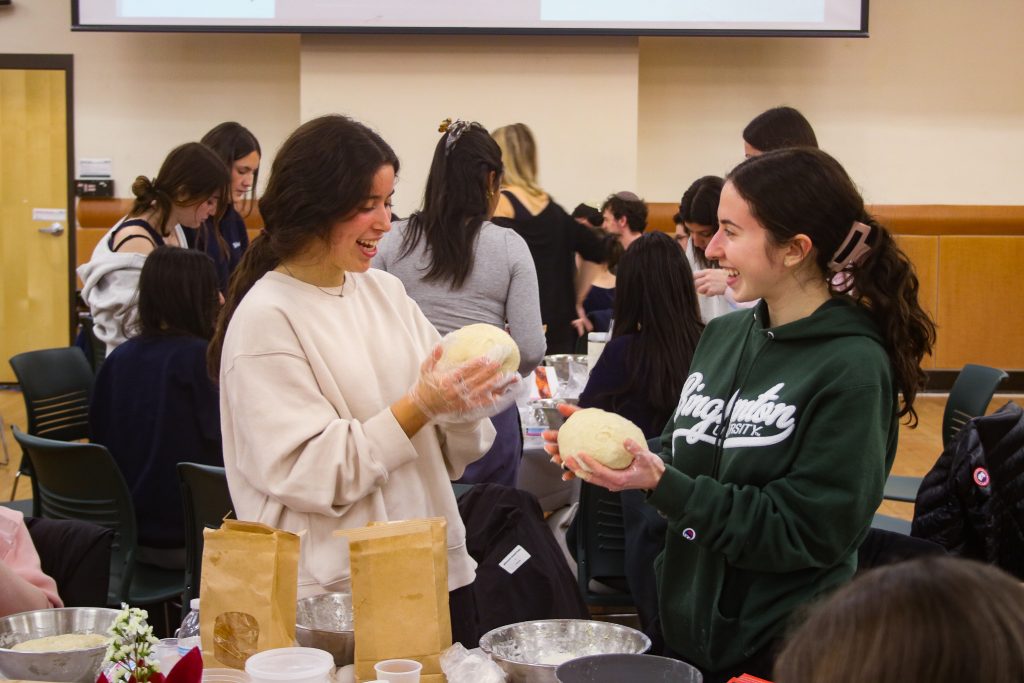Chabad at Binghamton hosted its annual Mega Challah Bake this Wednesday in the Mandela Room. Challah, a traditional Jewish braided bread, is typically baked weekly in preparation for the Sabbath, a day of rest when Jews from all backgrounds join together in prayer, food and joy.
Avigayil Simon, Chabad’s major programs coordinator and a junior majoring in art and design, led the planning for the Mega Challah Bake and explained challah’s symbolism.
“Challah is traditionally eaten at every Shabbat meal,” Simon wrote in an email. “Baking and eating challah fosters a sense of togetherness and community, as the tradition has been passed down through generations for centuries.”
Shoshanna Udler, an undeclared freshman who played a major role in preparing for the event, said “a successful challah bake will look like hundreds of students having a good time and overall feeling inspired and happy.”
Co-sponsored by various organizations on campus, including sororities Alpha Epsilon Phi and Sigma Delta Tau, the Alpha Epsilon Pi fraternity, Hillel at Binghamton, the Chabad Women’s League and the Beth David Synagogue, the Mega Challah Bake is one of Chabad’s largest fall semester events.
“Mega Challah Bake is Chabad’s yearly event where we gather Jewish students of all backgrounds together to bake challah as a community, giving students an opportunity to meet new people, have fun with friends, taste challah, and do a mitzvah (good deed),” Simon wrote.
At 7 p.m., students gathered in the Mandela Room in anticipation of the event. They were met with an array of delicious challahs to try, including sprinkle challah with a frosting dip, plain challah, zaatar challah — an Israeli spice with hummus — garlic challah with a garlic dip, babka — a chocolate baked good made from challah dough — apple cinnamon challah, cookie challah and crumb challah topped with sugar.
After the challah tasting, attendees converged at various tables, waiting for the program to begin. The room buzzed with excitement as students gauged the setup of ingredients in front of them in preparation for the challah bake.
As the program began, Goldie Ohana, the director of programming and engagement at Chabad, took to the stage to elaborate on the importance of challah in Jewish culture and to thank the countless people who participated in planning the Mega Challah Bake. Ohana spoke about the mitzvah of baking challah and the role mitzvahs play in encouraging people to do good deeds and follow the Jewish commandments.
Ohana then described the first few steps to making challah dough, including adding sugar, salt, yeast and water to the bowl as students followed her instructions. While waiting for the yeast to rise, a video played for the enjoyment of attendees, put together by Chabad members, emphasized the importance of patience in waiting for the yeast to rise. Afterward, the audience participated in a Jewish-themed game of Family Feud.
Students were then instructed to add flour to their bowls and knead and braid the dough. Meanwhile, Ohana led a prayer over the dough. Students had the option to add toppings like chocolate chips or crumbs to their challahs.
As the challah dough was completed and ready to bake, and the event came to a close, students were offered free tote bags as memorabilia and instructed on how to bake their challah at home.
Refael Rockman, a sophomore majoring in environmental studies on Chabad’s Social Committee Board, helped spearhead the Mega Challah Bake. He discussed the overall importance of carrying on the tradition of making challah.
“Challah holds deep cultural significance, tracing back to the first Jewish woman, Sarah,” Rockman wrote in an email. “As Jews, we are connected through our ancestors and traditions, including baking challah — a practice that links us to our foremothers. Wherever Jews are in the world, challah remains a staple food that unites us and reconnects us with our roots.”



